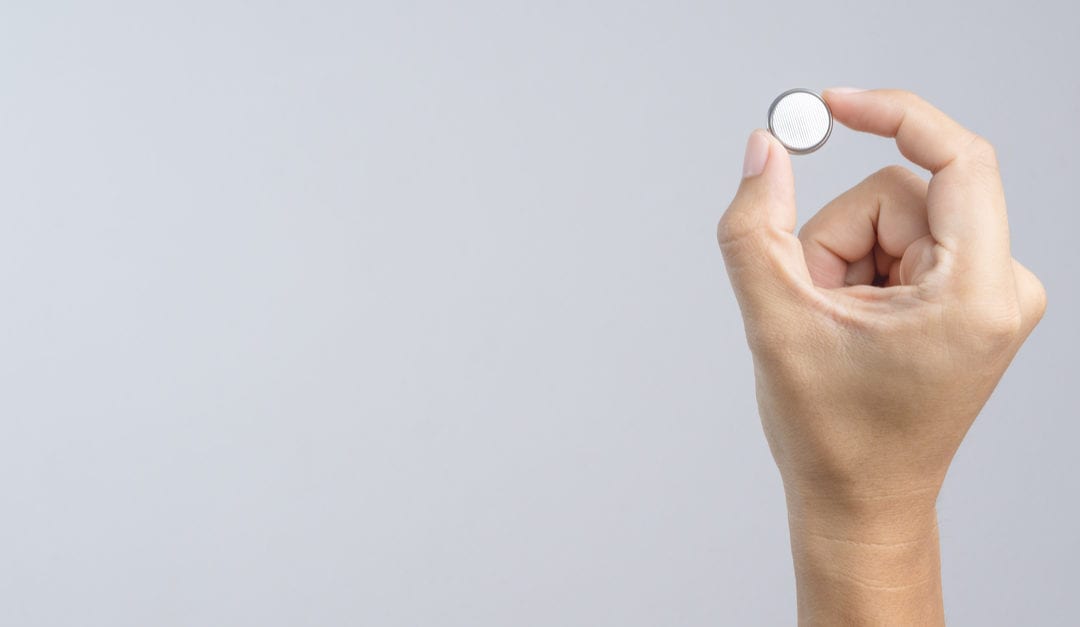The holidays are coming up and, for those who have children you know what that means: toys, toys and more toys. There are several toys that require batteries in order to operate so we want to be sure that parents and caretakers are aware of the risk associated with small children and button batteries.
If swallowed, button batteries can cause chemical burns in the esophagus, a nightmare for any parent. It’s possible for button batteries to pass through a child’s digestive tract without issue, but it is still absolutely vital for all parents and guardians to understand the risks of children swallowing a button battery and how to deal with the problem if it does happen.
The Dangers of Button Batteries
Button batteries may look small and harmless, but they can burn a hole through a child’s esophagus in just a couple of hours. That happens when the battery is swallowed and gets stuck to the soft lining of a child’s throat or the upper lining of the stomach, which can quickly turn into a disaster.
If the battery gets lodged in the esophagus and sticks to the lining, it will react to the saliva in the throat, allowing an electric current to flow out of the battery and leak chemicals like alkaline electrolyte into the body. The leak leads to a reaction that burns the soft tissue in the esophagus, and can even put a large hole in it that can lead to permanent damage or even death.
There are many indicators that let you know of the problem. A child that swallows a button battery may develop a hoarse voice, as well as drooling and trouble speaking. They may vomit or experience pain in the chest or the abdomen. The child may also suffer from diarrhea or difficulty breathing and swallowing.
It is very easy to mistake these symptoms for a different problem, and some patients may not have some of them. It is absolutely vital for parents to keep an eye on their children and be aware of any batteries that their children might be able to access to prevent the problem before it occurs.
Preventing the Problem
The best way to prevent this disaster from happening is to stop your children from having access to the batteries in the first place. Take time to store all of your spare batteries in places that your children cannot access. A high shelf is great, but be mindful of the placement, especially if you have cats that like to climb and may knock objects to the floor.
We also advise all parents to make it difficult to take batteries out of devices, especially if children are using them. Some electronics require a screwdriver or other tool to access the battery compartment, and those are much safer than ones that are easy to open.
Try to supervise your kids when they’re using any device that relies on these batteries. Children can be very good at getting into places that they shouldn’t, so your quick reactions might make all the difference when other preventative steps fail.
What Do I Do?
You will need to react as quickly as possible if your child does swallow a battery.
- Call the National Battery Ingestion Hotline at 1-800-498-8666, or your local poison control number. Follow any instructions that they give you. Do this immediately if you suspect a problem, even if you don’t see any symptoms.
- Identify the battery. You should be able to get an identification number from either a matching battery or the original packaging if you have it
- Go to the hospital
- Do not induce vomiting and do not allow your child to eat or drink
- Watch for symptoms that may show up over time, and keep an eye on the child’s stool to see if they pass the battery
How We Treat It
To treat a child that has swallowed a battery, an X-ray is performed at the hospital to determine whether the battery is lodged in the esophagus or is in the stomach and intestines already. The greatest risk of injury comes with the battery being lodged in the throat and causing chemical burns, which would require an emergency procedure to remove the battery and repair the damage.
However, if the battery did not adhere to the esophagus and is already in the stomach or intestines, the risk of injury is significantly reduced. Watch for symptoms that may show up over time, and keep an eye on the child’s stool to see if they pass the battery.
We at SLMA would much rather help parents prevent a problem than deal with an emergency after it starts. Fortunately, there are a lot of things that you can do as a parent or guardian to reduce the risk of your child swallowing a battery. Being vigilant, limiting access to devices with the batteries and securing the devices’ battery compartments will help reduce this risk and keep your child safe and sound.
If you like making sure your kids are safe, check out our blog, “Seat Check: Your Guide to Car Seats.”

